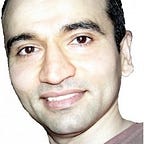Will Google Ever Become the Third Half of Our Brain?
“We want Google to be the third half of your brain”
said Sergey Bin in Sept 8, 2010 when Google launched 🔗Google Instant, and recently company CEO Sundar Pichai said that Artificial Intelligence will be more important to humanity than electricity and fire.
Compared to that, it comes as a total surprise when one encounters the statement that shows that the famous Greek philosopher Socrates even disliked the written words, all in the favor of wisdom
Their trust in writing, produced by external characters which are no part of themselves, will discourage the use of their own memory within them. You have invented an elixir not of memory, but of reminding; and you offer your pupils the appearance of wisdom, not true wisdom, for they will read many things without instruction and will therefore seem to know many things, when they are for the most part ignorant and hard to get along with, since they are not wise, but only appear wise (from Plat. Phaedrus 275)
We have seen the power of internet in the last three decades and now people are not wise, but only appear wise.
We are excited, and frightened as well, if we look at the recent exponential progress in the artificial intelligence technologies. Before Google’s victory over the best human players in the game of Go, artificial intelligence experts were not expecting it to happen so soon.
Google, Amazon, Facebook, Apple and Microsoft have accumulated so much power that our current regulatory system and intellectual community struggle to grasp
How Google Search Affect Our Brains
We can no more answer difficult questions. Our ability to retain information is at constant decline. We have become tools of our tools. We are now slave to our own technology. Google is not just destroying memory but it is making us dull by killing creativity.
The man who independently plucked the fruits when he was hungry is become a farmer; and he who stood under a tree for shelter, a housekeeper. We now no longer camp as for a night, but have settled down on earth and forgotten heaven. We have adopted Christianity merely as an improved method of agriculture. We have built for this world a family mansion, and for the next a family tomb. The best works of art are the expression of man’s struggle to free himself from this condition, but the effect of our art is merely to make this low state comfortable and that higher state to be forgotten. — Henry David Thoreau: Walden
Digital Slavery
Technology as an instrument of freedom. But, do you really see that?
What is easily available discourages deliberation and imagination
Nobody reads long-form articles we just power-browse on our screens and get this illusion that we understand. If we reach to the third paragraph some notification on our mobile device captures our attention and the next thing we know is that we are reading email. This is so much scattering of our attention that we have forgotten to do 🔗deep work in order to realize our true potential.
The technology that promised us leisure time and freedom has robbed us of whatever free time we had earlier. Technology that promised us relaxation is making us work longer and longer.
There is some much of information that comes out of our screen that we are constantly over-evaluating what is happening around us. Soon we will see ourselves adopting to our tools environment.
You need technology to assist you and there is no doubt about it, but next time when you have some real question i.e. What is the meaning of life? Pick a book on philosophy rather than just watching a TEDx video after searching “meaning of life” at Ted.com. 🔗Boredom is good, but make sure that these boredom-averting technology doesn’t make you boring person.
